I blow up a balloon - Study guides, Class notes & Summaries
Looking for the best study guides, study notes and summaries about I blow up a balloon? On this page you'll find 549 study documents about I blow up a balloon.
All 549 results
Sort by
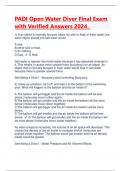 Popular
Popular
-
PADI Open Water Diver Final Exam with Verified Answers 2024.
- Exam (elaborations) • 24 pages • 2024
- Available in package deal
-
- $8.49
- 2x sold
- + learn more
1) If an object is neutrally buoyant (does not sink or float) in fresh water, the same object placed into salt water would A sink. B either sink or float. C do nothing. D float. D float. Salt water is heavier than fresh water because it has dissolved minerals in it. This means it causes more upward force (buoyancy) on an object. An object that is neutrally buoyant in fresh water would float in salt water because there is greater upward force. See Being a Diver I - Buoyancy and Control...
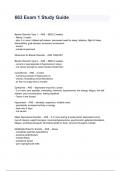 Popular
Popular
-
PADI, Open Water Diver, Final Exam Review Questions And Answers All Verified
- Exam (elaborations) • 14 pages • 2024 Popular
- Available in package deal
-
- $13.99
- 1x sold
- + learn more
PADI, Open Water Diver, Final Exam Review Questions And Answers All Verified D float. Salt water is heavier than freshwater because it has dissolved minerals in it. This means it causes more upward force (buoyancy) on an object. An object that is neutrally buoyant in fresh water would float in salt water because there is greater upward force. See Being a Diver I - Buoyancy and Controlling Buoyancy. - ANS 1) If an object is neutrally buoyant (does not sink or float) in fresh water, the...
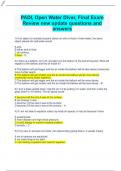
-
PADI, Open Water Diver, Final Exam Review new update questions and answers
- Exam (elaborations) • 13 pages • 2023
-
Available in package deal
-
- $11.00
- 17x sold
- + learn more
1) If an object is neutrally buoyant (does not sink or float) in fresh water, the same object placed into salt water would A sink. B either sink or float. C do nothing. D float. - D 2) I blow up a balloon, tie it off, and take it to the bottom of the swimming pool. What will happen to the balloon and the air inside it? A The balloon will get bigger and the air inside the balloon will be less dense (molecules move further apart). B The balloon will get smaller and the air inside the balloon wi...
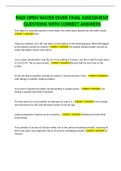
-
PADI OPEN WATER DIVER FINAL ASSESSMENT QUESTIONS WITH CORRECT ANSWERS
- Exam (elaborations) • 6 pages • 2023
-
- $7.99
- 4x sold
- + learn more
If an object is neutrally buoyant in fresh water, the same object placed into salt water would... CORRECT ANSWER Float I blow up a balloon, tie it off, and take it to the bottom of the swimming pool. What will happen to the balloon and the air inside it? CORRECT ANSWER The balloon will get smaller and the air inside the balloon will be more dense I turn a glass upside down, trap the air in it by putting it in water, and then I take the glass down to 10 m/33 ft. The air space would... CORRE...
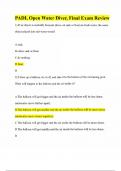
-
PADI, Open Water Diver, Final Exam Review
- Exam (elaborations) • 29 pages • 2024
-
Available in package deal
-
- $17.99
- + learn more
PADI, Open Water Diver, Final Exam Review 1) If an object is neutrally buoyant (does not sink or float) in fresh water, the same object placed into salt water would A sink. B either sink or float. C do nothing. D float. D 2) I blow up a balloon, tie it off, and take it to the bottom of the swimming pool. What will happen to the balloon and the air inside it? A The balloon will get bigger and the air inside the balloon will be less dense (molecules move further apart). B The balloon ...
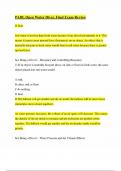
-
PADI, Open Water Diver, Final Exam Review
- Exam (elaborations) • 32 pages • 2024
-
Available in package deal
-
- $17.99
- + learn more
PADI, Open Water Diver, Final Exam Review D float. Salt water is heavier than fresh water because it has dissolved minerals in it. This means it causes more upward force (buoyancy) on an object. An object that is neutrally buoyant in fresh water would float in salt water because there is greater upward force. See Being a Diver I - Buoyancy and Controlling Buoyancy. 1) If an object is neutrally buoyant (does not sink or float) in fresh water, the same object placed into salt water would ...
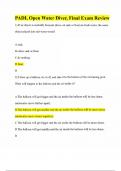
-
PADI, Open Water Diver, Final Exam Review
- Exam (elaborations) • 29 pages • 2024
-
Available in package deal
-
- $15.49
- + learn more
PADI, Open Water Diver, Final Exam Review 1) If an object is neutrally buoyant (does not sink or float) in fresh water, the same object placed into salt water would A sink. B either sink or float. C do nothing. D float. D 2) I blow up a balloon, tie it off, and take it to the bottom of the swimming pool. What will happen to the balloon and the air inside it? A The balloon will get bigger and the air inside the balloon will be less dense (molecules move further apart). B The balloon ...
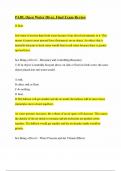
-
PADI, Open Water Diver, Final Exam Review
- Exam (elaborations) • 32 pages • 2024
-
Available in package deal
-
- $16.49
- + learn more
PADI, Open Water Diver, Final Exam Review D float. Salt water is heavier than fresh water because it has dissolved minerals in it. This means it causes more upward force (buoyancy) on an object. An object that is neutrally buoyant in fresh water would float in salt water because there is greater upward force. See Being a Diver I - Buoyancy and Controlling Buoyancy. 1) If an object is neutrally buoyant (does not sink or float) in fresh water, the same object placed into salt water would ...
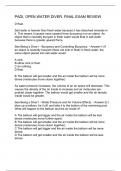
-
PADI, Open Water Diver, Final Exam Review
- Exam (elaborations) • 24 pages • 2024
-
- $13.49
- + learn more
D float. Salt water is heavier than fresh water because it has dissolved minerals in it. This means it causes more upward force (buoyancy) on an object. An object that is neutrally buoyant in fresh water would float in salt water because there is greater upward force. See Being a Diver I - Buoyancy and Controlling Buoyancy. - Answer-1) If an object is neutrally buoyant (does not sink or float) in fresh water, the same object placed into salt water would A sink. B either sink or float....
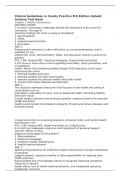
-
Clinical Guidelines in Family Practice 5th Edition Uphold Graham - Test Bank
- Exam (elaborations) • 133 pages • 2023
-
Available in package deal
-
- $20.82
- 3x sold
- + learn more
Clinical Guidelines in Family Practice 5th Edition Uphold Graham Test Bank Chapter 1 Health maintenance MULTIPLE CHOICE 1.A client is reviewing a videotape without the assistance of the nurse for instruction. The type of teaching strategy this client is using is considered: 1. demonstration. 2. slides. 3. programmed instruction. 4. discussion. 2.The nurse is instructing a client regarding food safety, injury prevention, and occupational health. Which of the following Healthy Peop...

$6.50 for your textbook summary multiplied by 100 fellow students... Do the math: that's a lot of money! Don't be a thief of your own wallet and start uploading yours now. Discover all about earning on Stuvia


